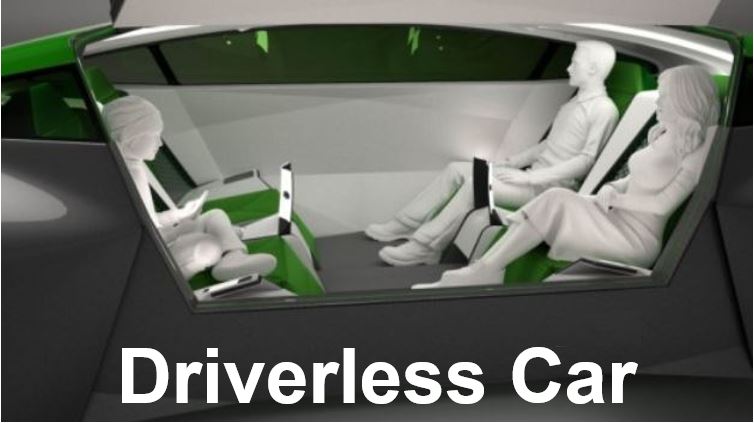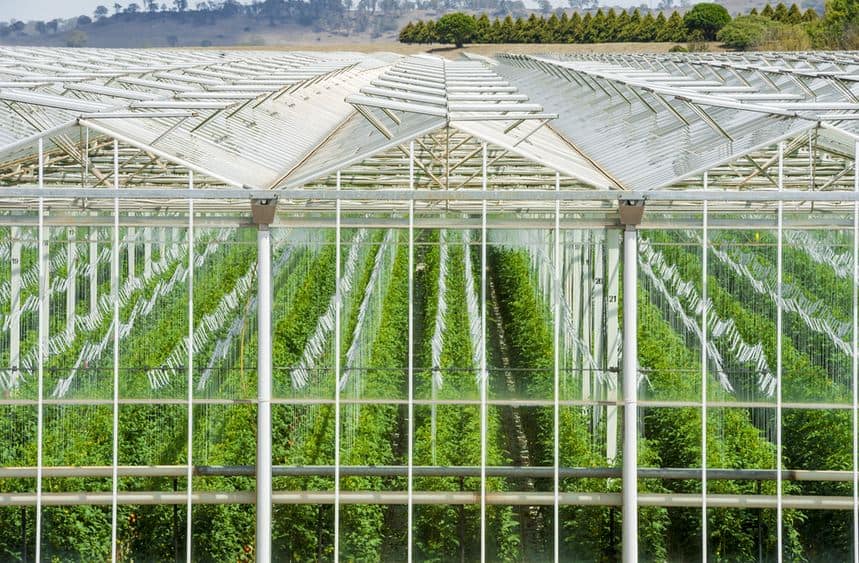Britons will live like today’s millionaires in 2050, the NHS will be completely different, agriculture will have undergone a ‘green revolution’, while our energy requirements will come from nuclear, gas and solar power – not wind – says a new monograph published on Monday 15th February, 2016, by the Adam Smith Institute.
The Adam Smith Institute, based in London, is a public-policy think tank, named after Adam Smith, the Scottish moral philosopher and classical economist, often cited as the father of modern economics.
The United Kingdom will use rapidly-growing trees to capture and store atmospheric CO2 (carbon dioxide) by the middle of this century.
 The interior of driverless cars will be different. Seats will not necessarily all be facing forward. (Image: futuretech4unow)
The interior of driverless cars will be different. Seats will not necessarily all be facing forward. (Image: futuretech4unow)
The monograph – Britain and the World in 2050 – by Dr. Madsen Pirie, President of the Adam Institute (AS), looks at the evolution of scientific research and attempts to predict how new technology will change the lives of ordinary Britons and solve their current health, environmental and energy problems.
The author predicts that the British economy will grow by an average of 2% annually, so that in real terms (after adjusting for inflation) Britons will earn twice as much as they do today by 2050. The average citizen will have the standard of living of today’s millionaires.
Agriculture will be transformed
After undergoing a green revolution, agriculture will be very different by 2050. There will be GM (genetically modified) crops that are saline-tolerant (they grow with salt water), drought-resistant, self-fertilizing, pest-resistant, heat-tolerant, cold-tolerant, and altitude capable. Genetically modified crops or food means that scientists have manipulated their genetic code.
We will be able to grow crops on land which is currently barren because it is not fertile enough.
Many of these new farming technologies will have been developed by British universities and laboratories. There will be trees that can reach maturity within six years, rather than the current fifty years. Tree cover in 2050 will be several times what it is today.
 Tomatoes growing in a huge greenhouse. Horticultural crops with bigger yields will be grown in protected facilities. (Image: aginnovators.org.au)
Tomatoes growing in a huge greenhouse. Horticultural crops with bigger yields will be grown in protected facilities. (Image: aginnovators.org.au)
Dr. Pirie wrote:
“The UK will be a pioneer in all of these developments, and many of the scientific breakthroughs will be achieved in UK laboratories and universities. Britain’s tree cover will be greatly increased over the years leading up to 2050, and the country will be renowned as the ‘Green Island,’ green for its environmentally friendly policies and practices, and green for its greatly increased tree cover.”
People will be eating genetically-hybridized vegetables and low-priced laboratory-grown meats. Factory farming as we know it will be assigned to the history books.
We will have developed micro-organisms which people can eat – they will be cheap, super-nourishing, and will considerably improve the country’s food security.
Healthcare and transport in 2050
Dr. Pirie suggests that the National Health Service (NHS) will have been radically reformed by the middle of this century. No hospital will be owned outright by the state. Health professionals, such as doctors, nurses, etc. will not be employed directly by the state.
Citizens will still receive state-funded healthcare, but it will come from private institutions – most of them being non-profit organisations, but not all. Britons will be given a choice of healthcare provider.
 Dr. Pirie wrote: “The actual provision of healthcare in the UK will be unrecognizable in 2050. There will be no state hospitals or state-employed nurses or doctors. Treatment will be provided by a range of independent hospitals, some of them run for profit, but many on a non-profit basis.”
Dr. Pirie wrote: “The actual provision of healthcare in the UK will be unrecognizable in 2050. There will be no state hospitals or state-employed nurses or doctors. Treatment will be provided by a range of independent hospitals, some of them run for profit, but many on a non-profit basis.”
The majority of cars will be driverless, i.e. they will be steered by artificial intelligence rather than a human. Diesel and petrol engines will not be allowed in cities. Most cars will be electric and people will be able to re-charge them at no cost.
Cars may look completely different from current ones. Rather than having two rows of seats facing forward, many vehicles will be customized as extensions of the office or home. Some may even have folding beds.
If all cars were driverless there would be fewer traffic jams, because the vehicles would be logged into a giant traffic network with an artificial intelligence monitoring and controlling traffic flow.
In the Report, Dr. Pirie wrote:
“They [cars] will be in automatic communication with other vehicles so that they can co-ordinate their driving. The owner will simply tell the car where to go, and the vehicle itself will calculate the best route to the destination and take its passengers there.”
Given that personal travel will be much more comfortable, less tiring, less stressful and safer than it is today, commuters in the future will probably be willing to commute longer. This may make city housing less appealing, and consequently not so expensive.
Electrification and autonomy will completely change other modes of transport. Self-driving buses will be common by 2050, as will driverless trains and underground systems.
Dr. Pirie believes the technological revolution will extend to air travel, with automated aircraft powered by high-energy batteries providing much of commercial transport.
Transsonic (near speed of sound) and hypersonic (at least 5 times speed of sound) airplanes will probably use fossil fuels mixed with atmospheric oxygen to power scramjets.
Cargo ships will be automated and electric powered, though they will still retain small crews. Their routes will be controlled by computers to avoid other vessels and rough seas.
Technology breakthroughs solve problems not lifestyle changes
According to Dr. Pirie, scientific advances and breakthroughs will solve most of our current problems, so that behavioural changes will become secondary. For example, asking people to travel less in their vehicles to reduce pollution won’t be necessary because vehicles in future won’t pollute like they do today.
To effectively solve our current environmental problems, it is better to invest in new technologies than trying to change people’s behaviours and lifestyles, the paper says.
Regarding the paper, Sam Bowman, Executive Director of the Adam Smith Institute, said:
“Futurology can often tell us as much about the present as it does about the future. In this paper we have shown just how many of our current problems are on their way to being solved, not by changing people, but by changing the world around us.”
“Dr Pirie’s vision for the future is an optimistic one that sees human ingenuity as the key to improving people’s lives around the world. The future often looks bleak because we focus on the negatives – but the reality is that things are getting better, much better, all the time.”
Futurology or future studies involves carefully analyzing current and historical trends and then suggesting possible future scenarios.
Employment and pensions in 2050
A greater proportion of the working population in the UK will be self-employed by 2050. By the middle of the century, self-employed people may represent the majority of working Britons.
The trend is part of the move away from lifetime employment with a single employer. Today, several workers already move from job-to-job regularly during the course of their lives – this trend will continue.
Self-employed people will have a succession of contracts with different clients or employers.
Pensions will have undergone a dramatic change by 2040. There will be no employer-owned pension funds for the majority of the workforce, given that it will be made up of self-employed individuals.
Pension funds will be the property of each worker, and successive employers will pay into them, while workers themselves will also contribute.
Dr. Pirie wrote:
“There will be no defined benefit pensions schemes based on final salary, and each individual’s fund will depend on the amount paid in by that person and their successive employers over the years.”
“People will have complete freedom to decide how to use their pension funds once they have reached a certain age, one which will keep advancing as people live longer, healthier lives.”
Video – Future Earth 2050
This WIRED video looks at three stories by acclaimed film-makers about the future of energy.

